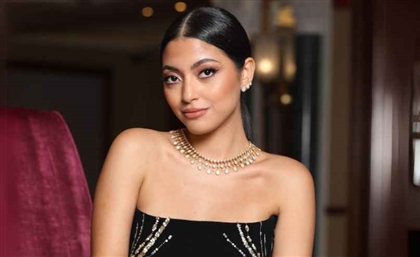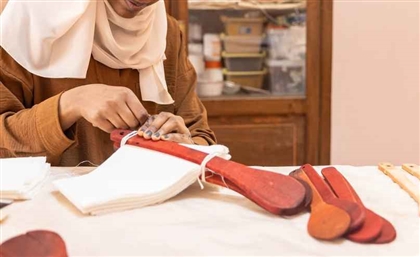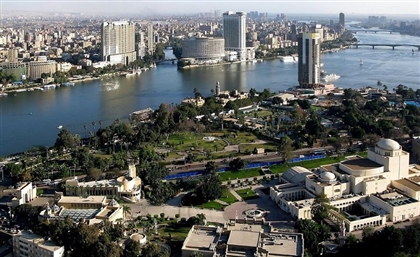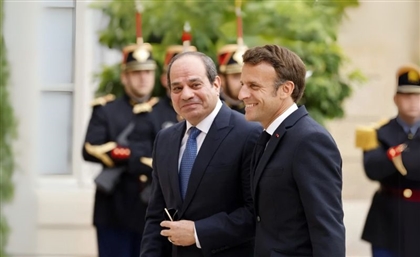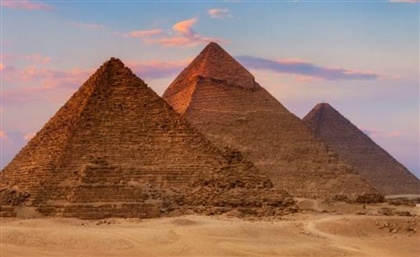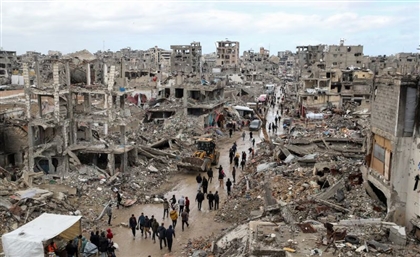Khalid Abdalla: No Binaries
You could call Khalid Abdalla many things: an actor, an activist, a cultural producer... just don't call him "a little brown boy" and definitely don't call him the Kite Runner. We put the star in our Spotlight for a very special interview...
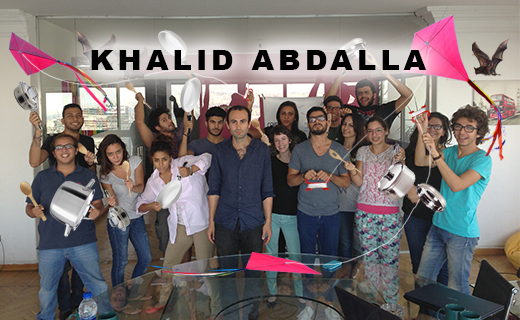
One of Egypt’s most successful artistic exports in this day and age, Khalid Abdalla (The Kite Runner, United 93, Green Zone) has been giving Middle Eastern characters much-needed humanity in the world of Hollywood blockbusters. And it’s no surprise – a man that says “politics is in everything,” he comes from a family of activists that were suppressed by successive Egyptian regimes, and is now one of the most determined voices in our country’s revolution. One of the brains behind the latest creative campaigns, Masmou3, designed to strike up dialogue on our ever-divided streets, Abdalla has his hands pretty full, what with directing and producing two independent movies, starring in an upcoming animation (as a Sufi bat, nonetheless) and speaking out against the binaries that plague our development. We talk to the man with too many labels to count about fame, foreignness and the feeling of wearing a brand new pair of socks…
Let’s start at the beginning; as a little brown boy in London how did your passion for film and theatre come about?
First of all, I’ve never described myself as a little brown boy in London. My passion started because one day a teacher came up to me and told me he thought I’d be good in a play he’s doing. I told him he was mad, but I went to the audition and got the part. I remember the first rehearsal was in a classroom where all the chairs where moved aside to make a square in the centre of the room. My character was in the first scene and I remember that square suddenly becoming a space in which the rules were completely different and I was in awe of it. I had that kind of pleasure you get when you’re playing a game. I was very lucky because I had another teacher that used to take the class to the Edinburgh Fringe Festival. At the time, we had a very successful theatre company made up of a bunch of schoolboys. We had four consecutive five-star reviews in the papers, which is unheard of. One of those reviews was a play that I directed called Someone Who’ll Watch Over Me, which made me the youngest director to ever get a five-star review on The Fringe. I then went off to university where I did lots of theatre and I founded a theatre company, which was also very successful and won various national awards. From the time of that first rehearsal, in that square, I knew that I found the thing I wanted to and loved. And it was the exact opposite of what I thought I would do, which is why I loved it.
What is it that you expected to do?
Both my parents are doctors but I was never pressured to become a doctor. In fact, they thought it was a bad idea but I thought maybe I wanted to go into it. Being what you would, and I wouldn’t, describe as “a little brown boy,” at home, you tend to get help from your parents in the sciences and maths and I was, at a certain period, better at those subjects than I was at, say, English or History. Then came the time to choose my A Level subjects and that coincided with when I was interested in theatre, acting and literature, so I decided to go with the exact opposite of the scientific route that was presumed of me. Not by my parents but by the “white” culture around me. So I decided to study English, History, Religious Studies and French.
Do you think not having a defined identity, being an Egyptian born and raised in the UK, has helped with your acting?
Actually, I have a very solid identity. Both my parents are Egyptians and I grew up speaking Arabic. But I had pretty much textbook British education; I went to a state primary school and a private secondary school and then Cambridge University.
Does England feel more like home than Egypt?
No, what I’ve discovered is that I’m someone who refuses binaries; the idea that you have to be one or the other, that life is so simple, that you can’t be both, differently, at different times or equally, at different times. In a way, I see myself as particularly Egyptian. The fact that I speak with this accent and English is my native tongue is an exact product of my Egyptianess. My grandfather and father were both politically active on the left. They were both imprisoned several times. My father was a big figure in the 70s student movement. On account of that, he had to leave the country. That’s why he went to Iraq, then Ireland and then Scotland, which is where I was born. They were always planning to go back but they found it very difficult because they got confronted with Mubarak’s corruption. So the ghorba was an exact product of what we’re fighting against now.
Was there a specific moment when you decided to become an activist?
I’m in London on the 25th of January and I’ve just finished making a film in which the first shots are of demonstrations. I say to myself, “the real issue isn’t whether the sit-in happened but whether it will continue until tomorrow.” I wake up the next morning and on the front page of The Guardian is the actress who played my ex-girlfriend in the movie I’d just been making about Egypt for the past two years. I still think that the 26th was a more important day than the 25th because people kept going. I’d say that day, I decided I had to [be involved]. The profile I’d built up until then gave me a set of responsibilities, which I decided to live up to. The real shift in activism came on the 25th of February. That day, we tried to reoccupy the square and were pushed out by the army. They took people and tortured them. That was the night I had the idea to make Mosireen because there were no images to prove what happened. I went home and I had some shitty footage on my iPhone but I’d forgotten how to edit. I was constantly on the phone trying to figure out how to do it. The people I contacted happened to have an empty space so we decided to try and do this project. So that took me on the journey with Tahrir Cinema, which later developed into Kazeboon. That’s what really turned me into an activist.

So what you’re saying is the films you make come to life? Why don’t you make a film about a utopian Egypt?
I’m not going to tell you what it is, but that film was offered to me. This is the crazy shit: if you look at the films I’ve done they’re about 9/11, Afghanistan, Iraq and Egypt. The latest one is back to Iraq and Morocco and it’s about a borderless identity. That’s the future.
A borderless identity? So why are you so patriotic?
Because I don’t define my patriotism by Egypt’s borders. I don’t define being Egyptian in the narrow view that tends to exclude Egyptians that have had bi-cultural upbringings. I strongly refuse that idea. On the other side, I believe that Egypt is the country that is most keenly fighting everything that is wrong in the world. Everything wrong in the world order, you’ll find in Egypt. All the fucking disgusting ideologies set up camp here. You see it in the street, socially, economically and environmentally. At a certain point that comes to a breaking point, which is what happened here. That’s why now it’s happening all over the place. First time I went to London after the revolution was during the big student movement. All of my friends when I arrived said, “What the fuck have you done, have you come and brought the revolution with you!?” I went into Trafalgar Square and, I kid you not, as I was walking in it was the weirdest thing in the world. It was like a hologram of Egypt. The only difference was that the police uniforms had changed and the people were drinking beer. But the flag was the same. One of the things that moved me most was seeing a banner being unfurled there saying: “We demand regime change.” It was the most beautiful thing for me to see.
As someone who doesn’t believe in binaries, does that mean that you are against the military as equally as you are against the Muslim Brotherhood?
No, it means that I’m against both in the same way that you can think two people are wrong but for different reasons. I don’t know exactly what my formulation would be; whether I’m against both or against the Brotherhood and not pro the army. But I believe that the current situation and the extent of the polarisation is making the ability to talk precisely about what we believe and what we’re allowed to condemn very difficult. I think that creates a problem for the entire country because it makes our discourse weaker, it makes us unable to challenge ourselves and it also puts us in a position of silence which it possible for us to be appropriated.
So how do we resolve all those issues?
By breaking the silence. I believe I am someone who hasn’t changed their position since all of this started and I have tried as much I can to have the courage to say what I think as early as possible when its difficult to say so. I’m part of a campaign called Masmou3…
Yes, tell us about that!
So I’ve been a part of founding Masmou3 and the idea behind it is very simple. If you feel more comfortable being unaligned or being against both – because I think those two things are different – or you feel comfortable saying I’m confused but I don’t think I’m with either side, then you confront yourself and go out to your balcony at 9PM, with a pan or a metal object, and bang and make some noise for a few minutes. It’s a strategy that’s been used in many struggles. I believe it’s currently being used in Turkey and it’s been used in Venezuela and in Iran, against the regime. The idea is, firstly, your relationship with yourself. I believe that staying at home silently depressed is not taking a position and allowing your position to be appropriated by others. Secondly, when you go out and bang, you’re not just stating your position but also asking others to challenge you and start talking about it. The advantages of that in the current situation we’re in are multiple: Number one, we are under curfew so obviously sound travels further. Number two, we’re at home, in a very polarised, dangerous atmosphere. Where better to talk through your confusion than with the people who love you and can accept that maybe you’re lost? Number three, you bang that pot and no one hears anything on the first day. The second day you go out and someone hears that noise again they go “What is that?” The third day maybe someone asks what you’re doing and you tell them. And again, you get into a position where you talk about it. Finally, after you have that conversation, maybe someone will agree. Then people start talking about Masmou3. And in some ways, it’s Masmou3 that has brought us into this room. However, we were shocked to find that the Brotherhood have tried to hijack it. They set up their own Facebook page and used the same time – 9 pm. If that’s not a sign that it’s working, I don’t know what is.

Let’s say Masmou3 is a great success and everyone’s talking about it - where do you take it from there?
We have to see where the country is when that happens. I’m someone who believes I’m a revolutionary in the sense that this country is so fucked it needs to start from a ground zero. That ground zero has to be what we agree consensually to in the constitution. After that constitution and fair elections, then I become a reformist; I become someone who believes we change things through arguing things out . The fact of the matter is, in this country – unlike other countries that call themselves democracies – we don’t have a real checks and balance system. It’s obviously very clear today, what with Mubarak being released and the state of legislation under Morsi and the constitution and all that. It’s the country’s conscience and people’s ability to go out on the street that ends up securing the country becoming what they want it to be.
I think the reason the country is in this cycle of someone coming into power and being removed is the fact that this country doesn’t want to live under authoritarian rule. It’s dealing with its demons of fascism. This strategy is a peaceful means of doing that. I believe we have an obligation to do that right now because both sides are using incredibly violent means and if we remain silent, they are able to behave this way without fearing accountability or without being able to see that we might disagree. And maybe that’ll be a thought that enters someone’s mind before they pull a trigger and maybe that ends up saving someone’s life who shouldn’t have been killed. Or maybe it enters someone’s thoughts on the Brotherhood’s side, someone who’s thinking of doing a suicide bomb, for example. He might think “Shit, is this going to get the country on my side or not?” I believe that that’s powerful.
The real binary is not between political Islam and the army. It’s between organised authoritarian fascism and disorganised social movements that have a humanist agenda. And so, in this situation of disorganisation, which we have to admit that we’re in, we have to find ways to form communities. That’s what we do online, by making sound, by demonstrating and by creating small organisations that reach a critical mass at a certain point and become what La Lel Mo7akmat became, what Mosireen became and what Tamarodbecame. One of the things that makes very angry about Tamarod,though, is the fact that they broke their contract. When people signed those documents, they signed with a pen but now it’s written in blood. I don’t know who will ever sign a petition of that kind again. And that’s a great tool that I believe that we’ve lost. The other thing is that I believe Tamarod are also abusing the contract they have with the people because they are going out and speaking as if signing that document meant giving your voice to them.
Did you sign the document?
No, I didn’t sign the document because I didn’t trust it from the very beginning. I also believe I’d made my voice clear in many other ways.
Would you subscribe to the conspiracy that the military planned all of this since the presidential elections?
No, I wouldn’t. I think this is about a structure of interests. I don’t believe that everything the military does is malicious. I believe that a lot of it comes from deeply held ideas which, when confronted with certain circumstances, behave in certain ways. I think they’re opportunists. I hold both them and the Brotherhood responsible for the situation we’re in, which I believe really began on the 19th of March with the constitutional declaration which was penned and supported by both of them. It created a political road map that started the idea of going to parliamentary elections and electing a president before having a constitution. Also, the idea that the constitution’s assembly is based on the majority of the parliament; I think both those ideas were incredibly insidious and stupid.
Would you go into politics?
I believe politics is in everything. My life is political. If you look at the Brotherhood, for example, one of their great successes is managing to change this country and its culture and what it says about itself without having one political position. I see my role as being one of many who are trying to reverse the terrible cultural dogmas that they’ve managed to imbed in this country and also trying to move it beyond the dogmas that were dependent on the Mubarak ideology of “it’s either us or them.” It’s not either us or them; that’s the other binary. We need to find something else and I believe that’s what this country is trying to do. The majority of my work on the political front tends to be through culture, which I believe is an incredibly important tool in changing how people think and their discourse. That, I believe, is a critical point where the world changes.
When you’re looking for a role or one is offered to you, is the political aim in the back of your mind?
Absolutely. It’s not to say that every decision is politically geared, but it is to say that if it compromises my political position then I won’t do it.

Would you do a romantic comedy in a manner of Maid in Manhattan?
I would if it wasn’t tokenistic. Jennifer Lopez’s booty is not enough for me to enter a film that might be stereotyping my identity.
What female lead would you be prepared to compromise your integrity for to act alongside?
To compromise my political integrity? None. But I don’t see it as compromising my integrity to have my sense of fun out there. I have a sense of fun. The thing about Hollywood is, why am I here? I’m not just here because I’m Egyptian. I’m here because I have something I’m fighting for. What I discovered is that we can never rely on people who don’t come from out culture to speak on our behalf. In order to have an international cinema that we’re comfortable with and that can represent us well, we need to have a strong cinema locally. In order to have that, we need to have a country that’s willing to accept what it means to have one. That, for me, embodies itself from Hollywood to the work I’ve been doing in film in Egypt to Mosireen to my presence on the street. They’re all one and part of the same thing. There have been some romantic comedies that have been suggested to me which never ended up being made. And there are some very bad ideas for romantic comedies, like Cairo Time.
Was that role offered to you?
No, it wasn’t. But it’s not a very good film.
You haven’t really answered our question. The question essentially was: who do you find hot?
There are many women I find hot. Probably all the ones you could think of. What do you want me to say?
Fine. Who would play Khalid Abdalla in a biopic of Khalid Abdalla and it can’t be Khalid Abdalla?
I don’t think there will ever be a biopic about me but I guess it’ll have to be someone who doesn’t exist yet because, in theory, I’ll be dead. I mean, you don’t have to be dead but it has to be someone who’s younger than I am and it’s not going to be someone who’s my age now. Frankly, I feel like I’m playing a biopic of myself.
You know what role was awesome? Salmon Fishing in the Yemen. Why did you not do that? Is it because Amr Wakid has green eyes?
I didn’t get the part. I went to the audition and, to be honest, I felt slightly weird about it because I’ve never been comfortable with the idea of playing a Gulf Sheikh. I don’t think it fits me and I think that’s probably why I didn’t get the part.
Is there someone you’d refuse to work with in Egyptian cinema?
I try not to make prejudgments. The last five years of my life have been spent between a film that never ends and a film that never begins. Part of what brought me here is a film called The Last Days Of The City which was supposed to be filmed in three months but took two years. When I was first sent the script, I pretty much dismissed it and then eventually I read it and found it very special. So I met the director, Tamer Said. It was clear that we could work together and we are now partners in a film production company called Zero Production. The movie will be finished by the end of this year. Theoretically, I have five films, which I’m involved in, coming out in the next 12 months. Two fiction films, two documentaries and an animation film in which I play a Sufi mystic bat. The animation is being made by this great group of Bosnian people.
What made you decide to take that role?
What the fuck more do you need? It’s a Sufi mystic bat! It’s a wonderful role. He’s one of the main characters in Birds Like Us which an old, Persian story about birds that live in a place in which they grow up not knowing they can fly and that anything exists outside of that place. They have this system in which the herbivorous birds have to give their eggs to the carnivorous birds but one herbivorous bird decides that she wants her egg to be her baby and breaks the system. As a result, her and some of the other birds get expelled. Suddenly, they find themselves at the foot of this cave, which they go into and they find this bat. So they ask the bat to help them return to their home. Since the bat is obviously blind, he has this theory that if he flies to the sun he will be able to see. So he says, “If you take me to the sun, I’ll take you back. You carry me by day and I’ll carry you by night.” So they go on this long journey thinking they found the sun but it turns out to be a lamppost. Then there’s this great scene where there’s this wind called the Horror and then they learn they can fly.
Gosh Khalid. Even in cartoons you make things super serious…
What are you talking about? That’s totally like Monsters Inc.! It makes you cry like when Simba loses his father in Lion King.

How do you go about choosing a role?
It’s not like I’m Jennifer Lopez getting a bunch of scripts every day and just going “Oh yeah, I’d like to play that one.” More often than not, I get scripts I’m not willing to entertain the idea of doing because I think they’re racist. Every once in a while one comes up which is beautiful. I’ve been lucky enough to have a few of those that are so beautiful I’m willing to change my life for them. That’s what happened in The Last Days Of The City and in this film I just finished in Morocco.
That being said, The Kite Runner is an absolutely beautiful film and you were great in it. What kind of preparation did you have to go through for that role?
I’ve never acted in the same language or dialect twice. I’ve had the peculiar fortune for every role that I’ve done to require a vast amount of preparation, whether for the language or the actual role itself. For The Kite Runner I spent a month in Afghanistan and I learned Dari, which is Afghan-Persian. I completely immersed myself in that culture and language. One of the difficulties of the role is that he is a weak character. It’s very difficult to have a weak character as your lead because generally it’s much easier to play a hero that everyone wants to be. So the big challenge was to somehow make him sympathetic the whole way through. One of the things I think I’m good at doing as an actor is giving people humanity. That’s what I did in United 93, The Kite Runner and Green Zone. The two other films that I’ve made here are different. Those films are contexts in which it’s taken for granted that people of our background have humanity.
That scene in the end of The Kite Runner is amazing. What’s the secret to perfectly flying a kite?
I learned how to fly a kite but in that scene in the end, the kite was graphics. I mean, can you imagine spending like $100,000 on a day of shooting and you lose your money because the fucking kite won’t go where you want it? I did learn how to fly kites well but there are days when you just can’t fly a kite. That day particularly there was a bit of rain.
Have you been kite flying since as a hobby?
No, I haven’t. I mean, can you imagine the fact that people who don’t know you refer to you as Kite Runner?

Do you ever find it difficult to get out of character?
Yes, that’s what I said I feel like I’m playing in a biopic of myself. I was in a film for two years in which I was an Egyptian filmmaker trying to make a film that never ends. Two years later I’m an Egyptian filmmaker filming a city and a revolution that never ends. You tend to find little bits and pieces carry with you. Both of those films have been very close to me, which is why I’ve been willing to give them so much of my life. If you can imagine spending two years filming a character that’s a part of you, all sorts of strange things are left with you from ideas to clothes to haircuts. It can be hard, especially if you really love the character; they allow you to have something in you be awoken. Another thing that’s been left with me is the language.
Do you still speak Dari-Persian?
I still understand it but obviously I haven’t practiced it in a while. I now speak Moroccan. And I played an Iraqi. So I have what a lot of Arabs don’t; I can understand a lot of dialects across the region. That’s why I use the word “Arab actor” to describe myself very carefully.
Has there been a role that’s changed you?
Yeah, they all have. From that first time in the classroom square, every single character either made clearer to me why I’m doing what I’m doing, or made me live in a different country or gave me friendships in countries that I wouldn’t have gone to otherwise. It’s taken me on a journey of living in the UK, France and coming here. I find it very difficult to describe what I do. It involves too many adjectives: actor, producer, filmmaker, activist, cultural producer…
Do you ever feel like you spread yourself too thinly?
I feel like I’m spread equally. My day involves a complete mind-fuck, frankly. I’m involved in so many things but thankfully they’re all coming to a point where they can begin to stand on their own feet. You have to have the courage with something like Masmou3 to make it belong to other people as well as you. I think that’s something that we face as a generation.
How often do you check your own IMDB profile?
I haven’t checked it for ages.
Do you Google yourself?
Yeah.
What’s the worst thing you’ve ever read about yourself on the Internet?
It’s all been alright.
How long do you spend getting ready before going to a premier of a movie?
It’s gotten less and less. In buying a suit, I’ll spend a little more because it will have the life that it deserves.

Where do you buy your socks?
Sad truth is, I care about socks. It’s kind of superstitious. I think it’s really important to have loads of socks because you don’t want your sock drawer to run out.
Where do you think all the socks go?
On my wife’s feet, mostly.
What’s a better feeling: getting a role you really want, or putting on a new pair of socks?
Fucking hell, getting a role. Fuck the socks!
If you were asked to make a film about Egypt in the last couple of years and you had unlimited funds, who would you cast as Mubarak, El Sisi and Morsi?
If it was being made now, I’d use real footage. Here’s the funny thing: everyone thinks I look like Alaa Mubarak.
What is your guilty pleasure of a bad Egyptian film?
I quite like [Ahmed] Mekky’s stuff.
We read that you don’t like being compared to Omar Al Sharif. Why is that?
A Hollywood actress once said, “The life of an actor goes like this: Who’s this actor? Get me this actor. Can we get someone like this actor? And then it returns to who’s this actor?” I guess I’m between one of those steps. It’s not that I don’t like being compared to him; I’m just an actor in a very different context. I deeply respect him. I think he’s a great actor. He’s much more beautiful and elegant than I am. He also came at a time when you could engage with Hollywood cinema very differently. Now they’d get a Russian actor to play Dr. Zhivago. Culturally, the position of Arabs in international cinema is very well defined. When he was in Hollywood, the world was less polarised around Arab identity. It’s too early to tell where my career is going…
You seem like the kind of actor who would purposely avoid becoming a commercial star.
No, I’m not. I just refuse playing the “little brown boy” and that’s what commercial cinema is asking. When they accept us without those dogmas then I’ll do it.
You’ve given yourself many labels: actor, producer, filmmaker, activist and we called you a “little brown boy.” If you could give yourself only one label, what would it be?
Please don’t make it the title of this article “Little Brown Boy!” I believe that what I’ve managed to build in maintaining my reputation is very valuable. When you do that, there comes a certain point when it’s recognised. If you keep selling out, you become less valuable. But if I had to say just one thing, it’d probably be "no binaries."
- Previous Article I Got Banged!
- Next Article Nomades Land




